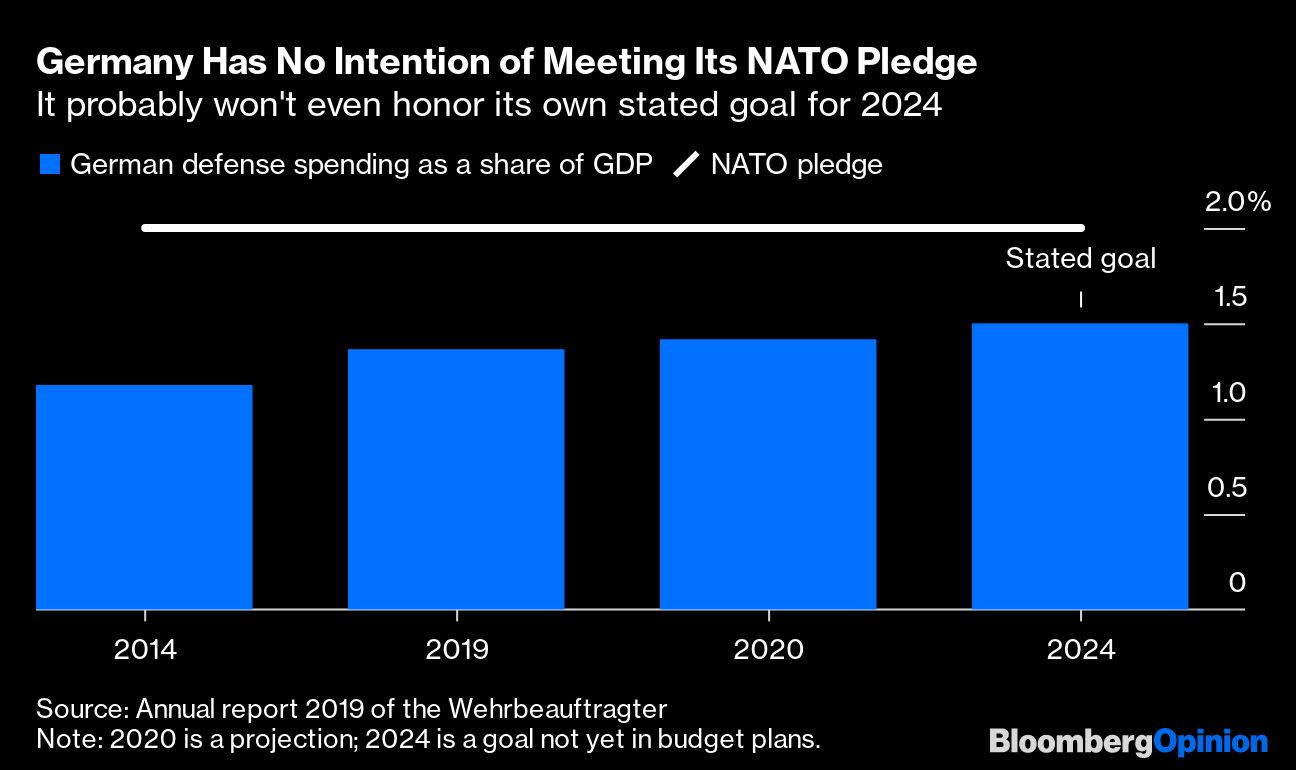 (Bloomberg Opinion) -- German tank crews have of late been practicing with Volkswagen minibuses because as many as three in four of their Puma tanks are in the repair shop — or rather, they’re waiting endlessly to be repaired, owing to Kafkaesque bureaucracy. Ordering backpacks, bullet-proof vests, helmets, visors and all sorts of other gear can take years in the German army. About 20,000 job openings can’t be filled because so few young people want to enlist. Officers complain that standards are being lowered, and that new recruits are “fatter, weaker and dumber.”
(Bloomberg Opinion) -- German tank crews have of late been practicing with Volkswagen minibuses because as many as three in four of their Puma tanks are in the repair shop — or rather, they’re waiting endlessly to be repaired, owing to Kafkaesque bureaucracy. Ordering backpacks, bullet-proof vests, helmets, visors and all sorts of other gear can take years in the German army. About 20,000 job openings can’t be filled because so few young people want to enlist. Officers complain that standards are being lowered, and that new recruits are “fatter, weaker and dumber.”
This is all according to Hans-Peter Bartels, an ombudsman appointed by parliament to audit the country’s armed forces. Among his devastating conclusions this week was this simple observation: Germany’s army would currently be unable to contribute adequately to the collective defense of NATO, the Western alliance, if any member were attacked.
Germany’s allies, from Poland in the east to the U.S. in the west, have long known and criticized this reality. President Donald Trump may be uniquely undiplomatic about it, but his predecessors going back at least to George W. Bush also harangued Berlin for the same reason. Germany, they’ve been saying, must stop free-riding, scrimping on its army and shirking its responsibilities in joint missions.
The government of Chancellor Angela Merkel always politely listened and nodded. In 2014, as Russia was invading Crimea, several senior German officials gave speeches calling for their country to take more international responsibility. Later that year, at a NATO summit in Wales, Merkel joined her fellow leaders in pledging to raise military spending to at least 2% of GDP within a decade.
Germany appears to have no intention of honoring that promise. “Nobody in Berlin is seriously planning a 2% army,” Bartels said. True, after drastic cuts in military spending following the end of the Cold War, Germany has started raising it again — from a low base. In absolute terms, it budgeted 43.2 billion euros ($47.6 billion) last year (though it didn’t spend all of that, owing to that red tape) and 45.1 billion euros this year. It’s hinted at more rises to come. But Bartels reckons that those won’t even get the country to its miserly stated goal of 1.5% of GDP by 2024.
The deeper reasons are found in post-war German culture. I’ve been on domestic flights in the U.S. when the pilot announced that a soldier was on board and the whole cabin spontaneously applauded. Roughly the opposite atmosphere exists in Germany. For decades after West Germany in 1955 established a new army, soldiers often got spat at while going out in uniform. Traumatized by the guilt of having started two world wars, Germans sought a new identity in being anti-war and anti-military.
Over time that understandable reaction to their own past morphed into a more off-putting smugness. Modern Germans don’t shoot, they trade, became the implicit mantra. In effect, Germany outsourced its defense, as well as the burdens of policing international order, to the U.S and, to a lesser extent, France and the U.K. Simultaneously, many Germans, especially on the political left, got on a high horse and moralized to their allies about being warmongers. All the while, Germany was exploiting the order thus preserved by becoming a mercantile superpower.
Some in Germany’s policy elite knew this wasn’t sustainable. In 2010, Horst Koehler, the federal president, said Germany should participate in more foreign deployments to protect its own national interests, which include keeping trade routes open. The outraged response was instant, widespread and hysterical. Koehler had to resign. Most politicians concluded that calling for a stronger army is the third rail of German politics.
It shouldn’t be. The world is a dangerous place, and NATO faces many perils, while a European Union army remains a pipe-dream. The biggest threat to Europe remains Russia. As researchers for the Swedish defense ministry have detailed, Russia has in the past decade made itself militarily much stronger, and could defeat (or blackmail) Europe by combining hybrid warfare, conventional military superiority and the threat of nuclear weapons deployed by new types of missiles.
So who should make that case to the German public? One possibility is Defense Minister Annegret Kramp-Karrenbauer, who’s a rather hapless candidate to succeed Merkel as chancellor. She’s even broached the subject, by suggesting a German-led effort in Syria at one point and more cooperation with the French in fighting terrorists in Africa. But each time she raises the topic she seems to sink further in the polls.
That leaves only Merkel. She’s already made herself a lame duck by declaring she won’t run again next year. But she remains popular and credible, having governed for more than 14 years and steered through many crises, including Russia’s aggression in Ukraine. She’s now trying to mediate in other conflicts, including the civil war in Libya. And she worries enormously about the U.S. under Trump withdrawing from its role as guarantor of Europe’s peace. She has less than two years left in office. She should use them to open a historic debate, by urging Germans to think differently about their army.
No comments:
Post a Comment